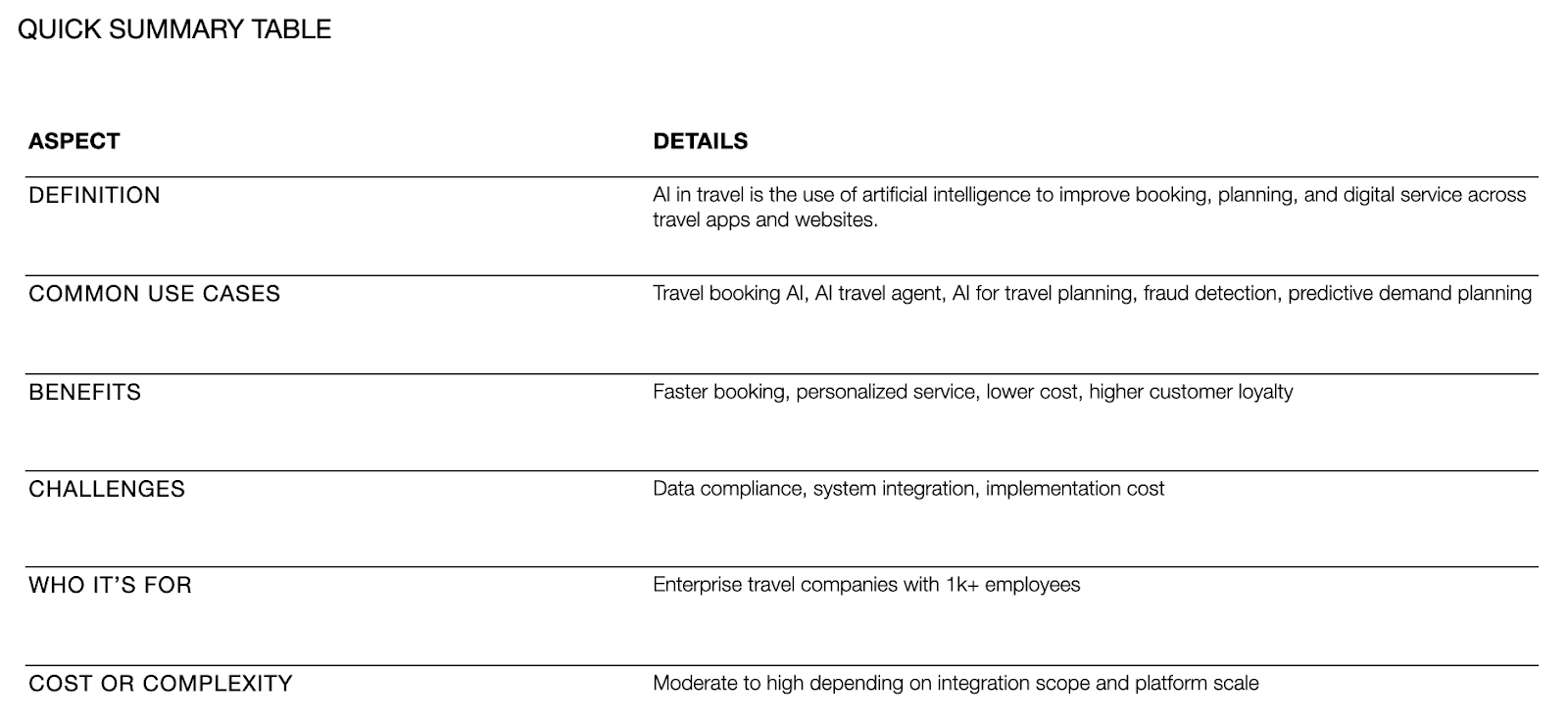
AI in Travel: How Top Travel Companies Use AI Apps & Websites
Travel companies face pressure to meet rising customer expectations while reducing operational inefficiencies. Many leaders know AI can help, but struggle to see where it fits across apps and websites.
This article explains how AI in travel can be integrated into digital platforms, what value it delivers, and why it matters now. Directors, VPs, and senior leaders at enterprise travel brands will find clear answers to common questions and practical next steps.
Market Context: Disruption & Opportunity
Travel customers demand instant personalization, faster booking, and seamless digital service. Traditional systems and manual workflows make it hard for travel companies to compete with digital-first players.
AI for travel has shifted from an experiment to a priority investment. Travel booking AI now powers predictive recommendations, AI travel planning tools, and customer support through AI travel agents. This matters because user experience directly impacts retention and revenue.
Leaders in the travel industry face two urgent questions: how to integrate AI in travel applications effectively, and how to ensure measurable ROI. Top travel brands see AI travel apps not as an add-on but as a requirement to stay competitive.
FAQs Snapshot

What is AI in travel?
AI in travel refers to the use of artificial intelligence across travel apps, booking platforms, and websites. It enables personalization, automation, and predictive insights. AI travel applications can analyze customer data, suggest trips, optimize pricing, and manage real-time updates.
Why is AI important for travel companies?
AI for travel gives companies the ability to serve customers faster and smarter. It reduces manual processes, enables personalization in booking flows, and creates predictive models for demand. This improves user satisfaction and helps brands scale without losing efficiency.
How can AI improve travel planning?
AI for travel planning supports users by analyzing preferences, budgets, and schedules. AI travel planning tools generate optimized itineraries and reduce search fatigue. A travel booking AI system can also recommend accommodations and flights while adjusting for real-time changes.
What is an AI travel agent?
An AI travel agent is a digital assistant that helps customers book flights, hotels, or activities. Unlike a standard chatbot, an AI travel agent uses natural language processing and predictive analytics to give accurate, context-aware responses.
What are common uses of AI travel apps?
AI travel apps handle bookings, send real-time updates, and provide personalized recommendations. Travel AI tools also manage loyalty programs, improve payment security, and enhance multilingual support. Many enterprise brands rely on AI in travel industry platforms to deliver consistent service worldwide.
What challenges come with AI in travel?
AI in travel industry platforms require strong data management and system integration. Travel companies must ensure compliance with privacy regulations. Leaders must also manage cost, employee training, and customer trust. While AI travel applications deliver value, they demand investment in setup and governance.
Benefits of AI in Travel
AI in travel gives enterprise companies stronger personalization, automation, and efficiency. For leaders, this means faster bookings, better margins, and higher retention.
AI for travel planning reduces decision fatigue and increases customer satisfaction. Travel booking AI improves speed and accuracy in reservations. AI travel agents provide 24/7 service at lower cost. AI travel apps improve loyalty through personalization. AI in travel industry platforms support better demand forecasting, pricing, and fraud detection. These improvements translate into stronger competitive positioning.

Let’s kickstart the conversation and design stuff people will love.

Deep-Dive Sections

What It Is & Why It Matters
AI in travel industry platforms combine machine learning, predictive analytics, and automation to enhance digital services. It matters because user experience now defines competitive advantage. Customers expect AI travel applications that save time and deliver accurate options. Without this, enterprise travel companies risk losing share to digital-first competitors.
How It Works
Travel AI systems pull data from booking engines, customer profiles, and external sources like weather or pricing APIs. AI travel apps process this data to recommend itineraries, optimize routes, or provide predictive pricing. AI travel agents interact with users in natural language, reducing reliance on call centers.
When to Use It (and When Not To)
AI for travel planning is useful when customers need quick, accurate suggestions or when companies must handle high booking volumes. Travel booking AI is less effective in areas with poor data quality or highly personalized luxury services that require human judgment. Enterprise leaders should evaluate where automation delivers measurable efficiency without harming brand experience.
Tools or Platforms Involved
Common platforms include AI travel applications integrated with booking engines, natural language processing chatbots, and predictive pricing tools. Large-scale AI travel apps may run on enterprise AI cloud services for scalability. Integration requires APIs and strong data pipelines.
Cost Considerations
Costs vary based on scope. An AI travel app with personalization features can be built on existing platforms with moderate investment. A full-scale AI travel industry integration, covering booking, loyalty, and support, requires larger budgets and multi-year investment. Leaders must compare short-term costs with long-term savings from automation and customer retention.
Integration or Setup Requirements
Deploying AI in travel applications requires clean data, cloud infrastructure, and integration with CRM and booking platforms. Teams must train models on historical data and set clear governance. Travel companies also need change management to train employees and align workflows.
Scalability & Flexibility
AI in travel scales well across enterprise environments. Once a model is trained, the AI travel app can support millions of queries with little marginal cost. Flexibility comes from modular platforms that let companies start small and expand to AI travel planning, AI travel agent, or travel booking AI capabilities as demand grows.
Alternatives or Comparisons
Alternatives include outsourcing digital support or relying on legacy booking systems. Compared to these, AI for travel offers stronger personalization and efficiency. However, travel leaders must balance automation with human service for premium experiences.
Trends
AI travel applications now focus on hyper-personalization, voice assistants, and predictive planning. The next stage involves AI travel agents capable of handling full itineraries across airlines, hotels, and tours. AI in travel industry leaders are also experimenting with augmented reality for trip previews inside AI travel apps.
Pros and Cons
Pros: Improved efficiency, higher personalization, lower cost, stronger loyalty.
Cons: Data privacy risks, setup cost, system complexity, risk of over-automation.
How G&Co. Can Help

G&Co. helps enterprise travel companies plan and deploy AI strategies with measurable results. Our consultants guide leaders in selecting the right AI travel applications, from AI travel planning systems to travel booking AI integrations.
We combine strategy with technical insight, helping brands align AI in travel with business outcomes. With our support, companies avoid wasted spend, accelerate adoption, and deliver AI travel apps that customers value.
Talk to us to clarify your strategy and move forward with confidence.
Conclusion & Next Steps
AI in travel is no longer optional. Leaders in enterprise travel brands need AI travel agents, AI travel apps, and travel booking AI to compete effectively.
At G&Co., we’ve helped enterprise clients apply AI for travel planning, customer journey redesign, and digital transformation. Our expertise enables brands to convert trend awareness into action.
Still have questions? Reach out and let’s solve them together.






%20(1).png)




